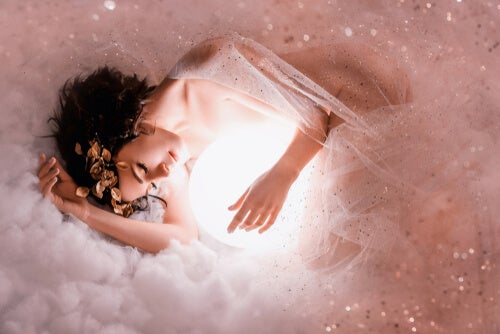A vast world opens up before you when you sleep. For instance, you might talk with those who’ve passed away, visit other places, or even dream about the future. Some people often speak of the latter. Furthermore, they’re convinced that what they dreamt of will eventually happen.
Memories and knowledge are intertwined in your dreams. When it comes to predicting the future, this tends to be related to your brain and imagination. However, when you create fictional content, inside or outside of dreams, you rely on your life experience.
Does this mean that your premonitory dreams are likely to come true? Well, as is often the case, between myths and reality there’s a bridge. In this case, the bridge takes the form of scientific studies. These explain the phenomenon of dreams of the future that were formerly thought to be caused by magic.
What happens in the brain when you dream?
Deep sleep oscillates between two phases. These are REM and NREM. There are important differences between them:
- REM phase or Random Eye Movement. Paradoxically, the activity during this stage is very similar to that of when you’re awake. However, your brain stem blocks your muscle movement. This means the actions that you dream of aren’t actually reproduced. REM is characterized by fast brain waves.
- Non-REM or NREM phase. In this phase, you sleep more deeply. You have low brain frequencies – less than 4 Hz. During this stage, your brain reacts minimally to external sounds. In addition, you’re less likely to wake up.
In the REM phase, you tend to experience the strangest, longest, and most memorable dreams. However, in either phase, you’re more likely to dream when the brain waves are weak. When they’re stronger, you’re more likely to feel as if you’ve slept really deeply and as if you haven’t dreamt at all.
The posterior parietal area and the prefrontal cortex are responsible for the sleep experience.
Dream and memory, dreaming of the future
A recently published study revealed some interesting facts about the relationship between sleep and memory. The most relevant is that NREM sleep is involved in the consolidation of episodic memory. On the other hand, REM sleep establishes and regulates emotional information. It also favors creativity and perception.
Furthermore, the time of night when you dream is also relevant. In fact, the study found that early morning dreams tend to be related to everyday life. However, at night they’re more relevant to your emotions.
Taking this into account, the content of your dreams is associated with vital information that you provide.
When you’re awake, you process your memories in order to prevent possible risks and threats to yourself. This combination of memory and imagination fulfills a basic adaptive function: to predict the future. Since it’s an implicit mechanism in thought, is it possible that dreaming about the future is also possible? Read on to find out.
The evolutionary value of predicting the future
In evolutionary terms, any animal that can move must be able to predict where it might find food, predators, and mates. When they make these kinds of predictions, they have to remember their own experiences or those that were passed on to them in some way. For example, maybe they traveled through the same area earlier and found food.
Predictions, whether they’re carried out for reasons of sheer survival or everyday events in urban life, are formed from a code. This is made up of mental images, reasoning, and emotions. However, the prediction process also occurs when you’re asleep, as your brain can be as active as when you’re awake.

Is it possible to dream about the future?
If you’re thinking in the mystical sense, no. You can’t dream of the future. Dreaming won’t give you a foolproof answer as to what’s going to happen to you. That’s not how it works. In fact, it involves an inference that you’re just as likely to make when you’re awake.
The study that reviewed this question found that, through patterns of discernment inherent in life experiences and knowledge, REM dreams can represent associations between memory and imagination. In this way, they create new mental content. Therefore, with this process, you could possibly dream of a future scenario.
In other words, it’s not a question of precognition, but an unconscious inference that has a certain probability of being fulfilled. For this reason, when something happens in real life that you dreamt of, you tend to feel that your dream really predicted it.
As you can see, dreaming about the future and then having it come true is perfectly possible. Furthermore, there have been instances of patients who lost the ability to dream after suffering bilateral lesions of the ventromedial region or the temporoparietal junction. Interestingly, they also lost the ability to imagine possible future scenarios. This suggests that both processes are cognitively linked.
https://lamenteesmaravillosa.com/es-posible-sonar-futuro/
The post Is it Possible to Dream About the Future? appeared first on Exploring your mind.













Comments